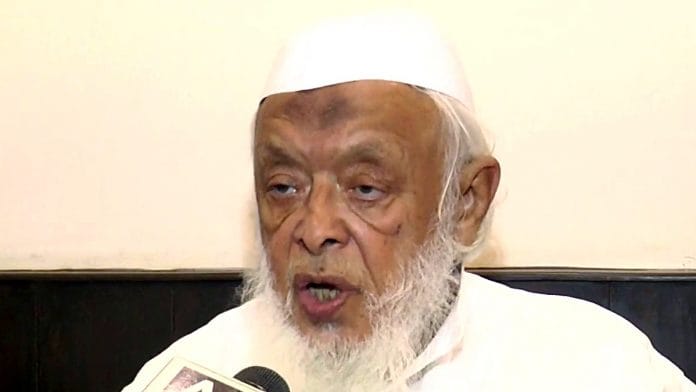New Delhi: Muslims don’t need government aid for their educational institutions, nor do madrasas need affiliations with any government board, Maulana Syed Arshad Madani, the sadar al-mudarrisin (head of academic affairs) of Darul Uloom in Deoband, said Sunday.
Madani was speaking after a national conference of the ’Kul Hind Raabta-e-Madaris-e-Islamia’ (All India Islamic Madrasa) in Deoband in Uttar Pradesh’s Saharanpur district.
The Kul Hind Raabta-e-Madaris-e-Islamia is the country’s largest madrasa management and is affiliated with Darul, the world’s second-largest Islamic seminary and among its most prestigious Islamic institutions.
Among the issues discussed at the conference was the ongoing survey of madrasas being conducted by the Uttar Pradesh government.
Madani, also president of the Jamiat Ulama-i-Hind — one of India’s largest socio-religious Islamic organisations — presided over the meeting, which saw representatives from over 6,000 madrasas in attendance, sources close to him told ThePrint.
“We do not need any government aid for our madrasas and mosques. There is no need for madrassas to get affiliated with any government board. We have been given [the] right under Article 30 (1) of the Constitution to establish our madrasa independently for religious education,” Madani tweeted Monday.
Speaking to ThePrint, Madani said aspersions being cast on madrasas or Muslim institutions “is not a new thing”.
“It is a product of communal minds. But madrasas have been doing their job for 800 years and they are not schools of terrorism but institutions that teach brotherhood among religions. Such statements are a product of ignorance. Anybody can come and see what we do,” he said.
The Uttar Pradesh government is currently conducting a survey of madrasas in order to identify unrecognised madrasas and gather details such as organisations running them, curriculum, and source of income.
The state government maintains that the objective is to get data on the number of unrecognised madrasas running in the state but the decision has already sparked a political row. Opposition parties such as All India Majlis-e-Ittehadul Muslimeen (AIMIM) accuse the state government of” harassing Muslims”.
While the final results of the survey are still awaited, initial reports say that Darul Uloom Deoband is among the madrasas that were not recognised in the survey.
Also Read: Want UP-style madrasa surveys, mosque CCTVs in police control, says new Uttarakhand Waqf Board head
‘Madrasas need to keep affairs in order’
However, Madani dismissed as “propaganda” the reports that Darul Uloom isn’t recognised.
“It has been there for 150 years. We run so many big institutions. Its [Darul Uloom] alumni are spread far and wide, in the US, the UK, Switzerland, and South Africa to name just a few. This is an institution with global standing not a fly-by-night operation in a jungle. We have all necessary registrations under the Societies Act [Societies Registration Act, 1860] and other relevant laws of the land,” Madani said, adding that Sunday’s meeting was a “routine” affair” that happens every three years.
“We call madrasas from across the country. This time, because of the pandemic, it happened after three years. Madrasas were concerned about the survey in Uttar Pradesh. We told them that something of this nature can come up in other BJP-ruled states too. So, it is absolutely essential that they keep all their affairs — from land to permissions to registrations — in order. But [we also] assured them that this should not be viewed as a bid to harass the community,” he said.
ThePrint reached out to some madrasa representatives who were present in the meeting but they declined to comment.
“We’ve authorised Maulana Arshad Madani to make all statements on our behalf,” said a senior functionary of a madrasa in western Uttar Pradesh.
16,000-plus recognised madrasas
According to initial reports, the survey has found approximately 7,189 unrecognised madrasas in Uttar Pradesh and 16,513 recognised ones. Out of these, 560 receive grants from the state government.
In a statement issued Sunday, Madani said the organisation wasn’t against modern education.
“We also want the children of our nation to become engineers, scientists, lawyers, and doctors. They should prepare for appearing in competitive exams and get success, but we also want our child to learn religion and its beliefs first,” he said, “because, just like the nation needs doctors, lawyers, barristers, and engineers everywhere in life, our nation needs a better mufti [cleric] and a better religious scholar, which can be fulfilled only through madrasas.”
“Not only us, but followers of other religions also need religious people. That’s why we favor the system of madrasas,” it said.
(Edited by Uttara Ramaswamy)
Also Read: Massive dropout, no salaries, UP madrasas gripped in a climate of fear, bulldozer worries






